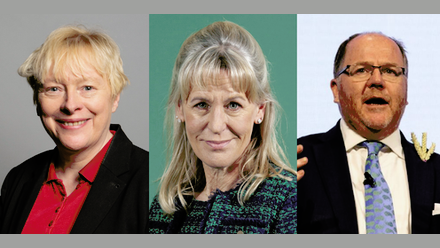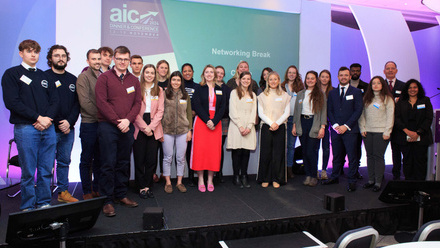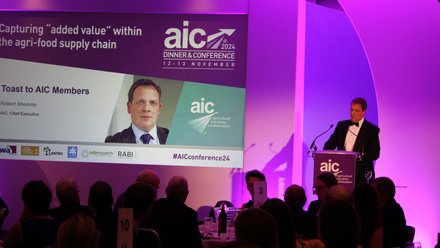AIC Conference 2023: Agri-food industry focuses on "Working with Natural Capital"
- Best-ever attended AIC Conference marks trade association’s 20th anniversary
- AIC Chief Executive Robert Sheasby calls for policies that foster certainty and support food security
- Uncertainty causing a ‘huge decline in investment and planning’ says Adam White, Barclays' Head of Agriculture
- Defra Minister Mark Spencer’s speech highlights multi-million-pound investments to be made in innovative technologies to improve sustainability in the food system
- View and download event photos on AIC's Flickr page
- Watch Conference videos on AIC's YouTube channel
This year's AIC Conference saw a record turnout as the industry came together to discuss "Working with Natural Captial within the agri-food supply chain" in Peterborough on Wednesday (15 November).
Delegates from across the nation and abroad agri-food sector heard a range of thought leaders from politics, business, academia and trade to consider this year's Conference theme and celebrate 20 years of the Agricultural Industries Confederation (AIC).
Watch the Conference videos below.
The UK's agri-supply trade association's Chair, Chris Guest, opened the event by setting the scene for the theme of the Conference and discussions on the AIC-commissioned independent report assessing the challenges and opportunities for food production in the UK.
Addressing the packed Conference venue, Mr Guest reiterated that sustainability remains a core focus for AIC and the wider industry, given the need to deliver a resilient and sustainable food supply chain.
View photos from the Conference below.
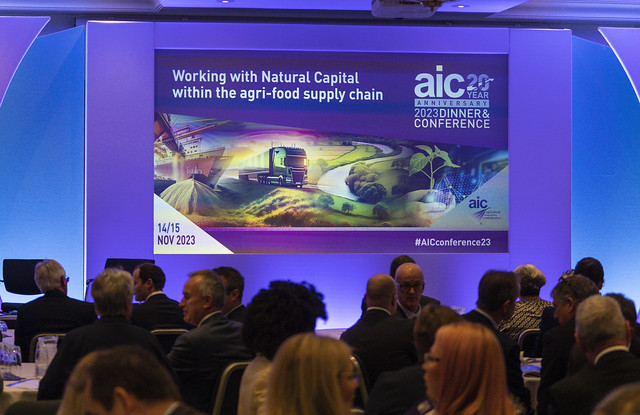
Fragile food security
AIC's Chief Executive Robert Sheasby discussed the increasing importance of sustainability to supply chain customers and sections of the wider society, as well as how we manage the demands required of our land.
“If we are to deliver on the combined demands required of our land, then it is reasonable that we should have a land use strategy. The demands on this scarce, yet critical resource should be thought about strategically rather than in what currently feels like an ad hoc manner,” he told delegates.
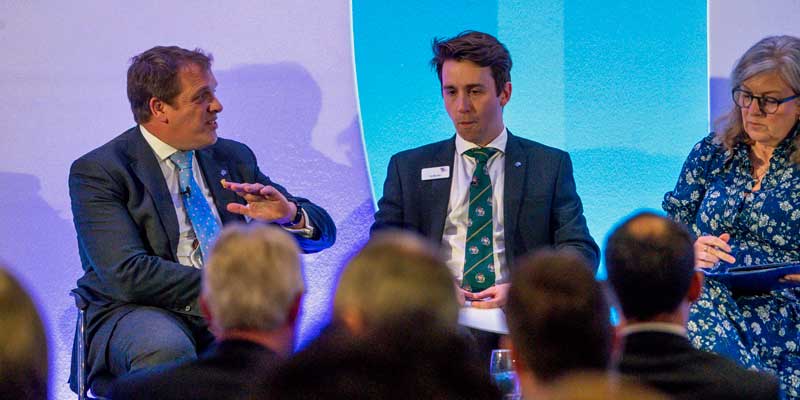
He was quick to point out that government policy can affect confidence for better or worse and spoke about current uncertainty leading to reduced investment and waning productivity.
This uncertainty, he said, raised serious questions about UK food security. “The past two years have clearly shown that UK food security is more vulnerable than we think. From salad availability to labour shortages, global supply chains have been stretched to and, at times beyond, breaking point.
"The responsibility of a country is to keep its people safe and to keep them fed. For the first time in more than a generation, we feel less certain than before. This is why policies that support food security should be encouraged.”
Mr Sheasby called for an independent UK Food Security Committee to be established, referencing the key finding of the Powering Productivity report. Such a committee, the report says, would ensure that people in the UK are kept safe with food supply maintained.
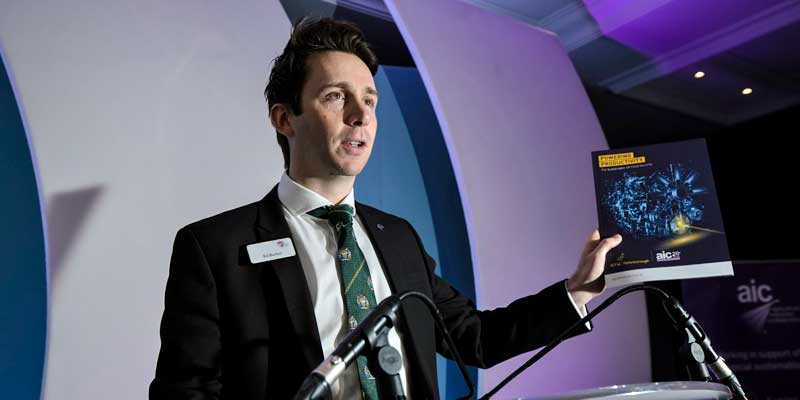
Ed Barker, AIC’s Head of Policy and External Affairs, explained that agri-food supply is operating against the backdrop of a volatile world and therefore, there was a need to understand yield gaps and how much food is not being produced sustainably.
The independently-authored report by Dr Marcus Bellett-Travers of Anglia Ruskin University examines this, pointing out that issues should not be looked at in isolation as they are inextricably linked to other challenges.
“Solving one problem can lead to further pressure in other areas. The industry relies on solutions to each problem for us to see improvements,” said Mr Barker.
Revealing the report at the Conference, he commented on how he hopes that it will be key to the development of a long-term cross-party UK-wide approach to planning for improved food security, with the burden not falling solely on the Department for Environment, Food and Rural Affairs (Defra).

NFU President Minette Batters agreed on the need to work together and collaborate as one supply chain. In a largely positive address to the Conference, she commented that while the world has completely changed, collaboration can pave the way for success.
“There is more that unites us than divides us,” was her rallying cry, which preceded a discussion around the challenge that the building blocks for natural capital aren’t there and must be developed, as well as calling for a standardised approach to food production to allow for the measuring of baselines.
She ended her speech by giving her response to a question she was asked about how the below-average return on natural capital for UK farmers can be tackled.
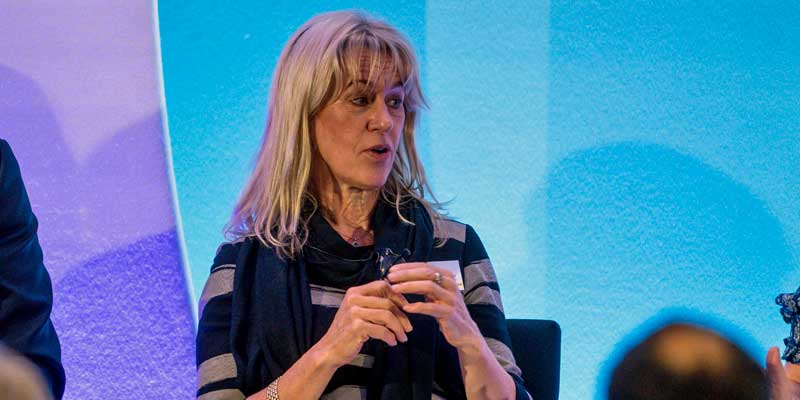
The answer lies, she said, in corporate social responsibility, which needs to change from the top. Retailers and brand holders must demonstrate they are supporting agriculture and farmers, and the risk must be shared further up the supply chain.
Economic headwinds stunt investment
In a poll of Conference delegates, 47% disagreed that the economic outlook for agriculture over the next 18 months is positive, reflecting the lack of confidence addressed by speakers.
This sentiment was reflected by Adam White, Head of Agriculture at Barclays. “Around summer, we saw a huge decline in investment and planning due to uncertainty.”
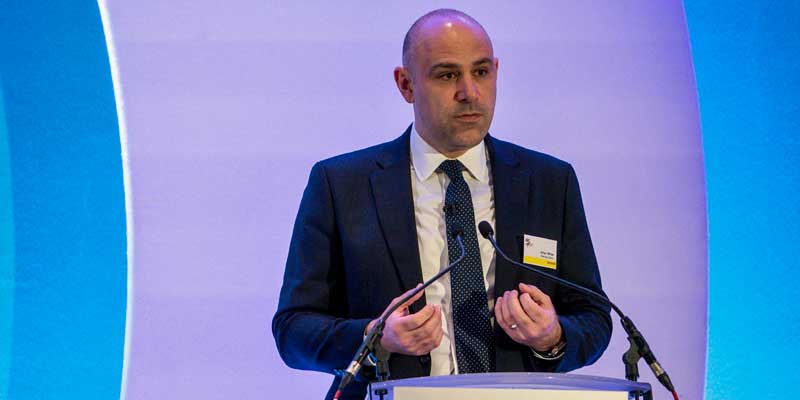
He welcomed the findings and recommendations of the Powering Productivity report and said it would provide certainty for farmers.
Sir Charles Godfray, Director of the Oxford Martin Programme on the Future of Food also welcomed the report, calling its core recommendation of a UK Food Security Committee “a great idea.”
Highlighting that the UK has one of the most innovative agricultural industries in the world, he spoke about the need for marrying that innovation with a focus on maintaining natural capital.
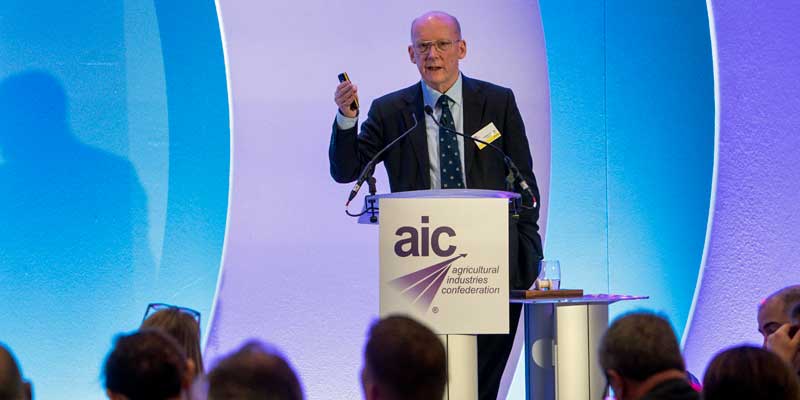
“All land must be productive. We need to see an increase in traditional productivity on-farm, but also public productivity, such as biodiversity," he said.
"We need to use all the benefits of technology to allow us to become truly sustainable but also pay close attention to the ecological insights.”
Political priorities
In Farming Minister Mark Spencer’s speech, delivered by Defra’s Deputy Director Tim Mordan, there was an acknowledgement that the report was thorough and focused on important themes in detail, such as improving productivity and enhancing the environment.
The speech reflected Sir Charles Godfray’s comments on the need for innovation, highlighting Defra’s commitment to research and development. A £30 million investment in solar installations and robotics equipment was given as an example of this.
Tim Mordan spoke of Defra and AIC as being "critical friends" with the trade association providing feedback on the success of policy implementation on the ground.
The Cabinet Secretary for Rural Affairs & Islands, Scotland, Mairi Gougeon, MSP further emphasised the support that exists across the industry and in government for the Powering Productivity report.

Pointing to the need to give food security focused attention, she welcomed the report and its conclusions. Leaving delegates in no doubt about the Scottish Government’s position, she said: “The priority is to provide as much certainty as possible.
"There is currently no clarity from Labour or the Conservatives about farming funding but in Scotland, we would like a return to what we had before Brexit. The Scottish Government remains fully committed to supporting farming.”
Lesley Griffiths, MS, Cabinet Secretary for Energy, Planning and Rural Affairs in Wales spoke of the strong link between agriculture and communities in Wales, and acknowledged tough decisions on the Welsh Government's spending in this area.
She discussed the need to ensure resilience in terms of natural capital as the Welsh agriculture industry grows and evolves, as well as the importance consumers place on animal welfare.
“The focus on good animal welfare has led to farmers being rewarded for good welfare practices which in turn enables them to be more resilient and efficient in the face of climate change,” she commented.
Precision breeding opportunities
Leading scientists and academics took to the Conference stage to discuss the new Gene Technology (Precision Breeding) Act 2023. The theme of the discussion was whether the new legislation represented a new era for the UK.
Dr Penny Hundleby FRSB, Senior Scientist at the John Innes Centre discussed how gene editing could prevent common issues, such as early pod shatter in OSR.
By preventing these issues, gene editing has the potential to benefit farmers, the environment and the economy through creating more resilient crops, increased yields, and healthier foods.
Though the science behind this seems like the driving factor, it is only part of the story, say Dr Hundleby. “It is down to consumers and the industry as to whether these technologies are embraced. These genetic methods still come with the controversy following GM foods; we need not be afraid of new, sophisticated technology.”
When asked about the main value of precision breeding for consumers, Dr Hundleby replied that it could improve crop resilience against climate change, enable more sustainable farming, and improve animal and human health. The improvement of human health seemed to resonate most with the delegates.
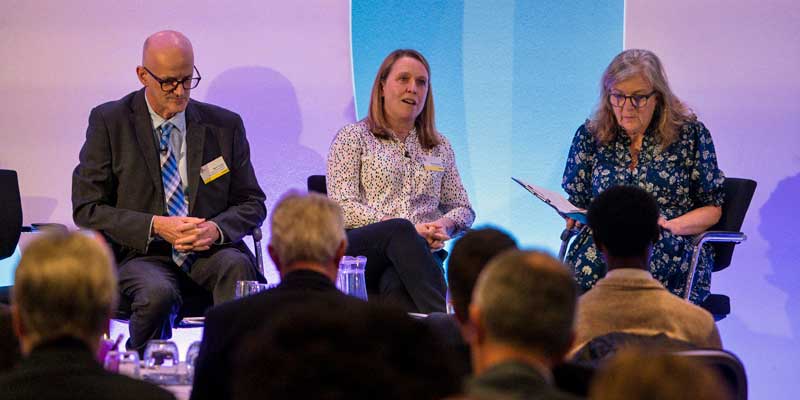
In addition to the innovation of gene editing, the role of AI was discussed by fellow panellist, Dr Mark Young, Innovation Specialist at the Centre of Innovation Excellence in Livestock (CIEL) who spoke about AI providing an opportunity to make sense of vast volumes of data.
The role of data in ‘measuring to manage’ was highlighted by Professor John Gilliland from Queens University Belfast, whose specialism is Land Management in Northern Ireland. “If you can’t measure, you can’t manage. But now there is a generation of technology available to allow us to do that. The data allows us to go to a greater level of accuracy.”
Referring to a pilot study of three catchment areas where farmers were provided with in-depth data about their farms’ performance, he notes that farmers changed their behaviour as a result. “86% of farmers changed their fertiliser type based on the findings, 80% increased lime usage, 68% changed fertiliser quantity, and 28% changed the quantity of slurry they imported and exported. The findings allowed them to identify problem areas and make improvements which enabled them to become more sustainable.”
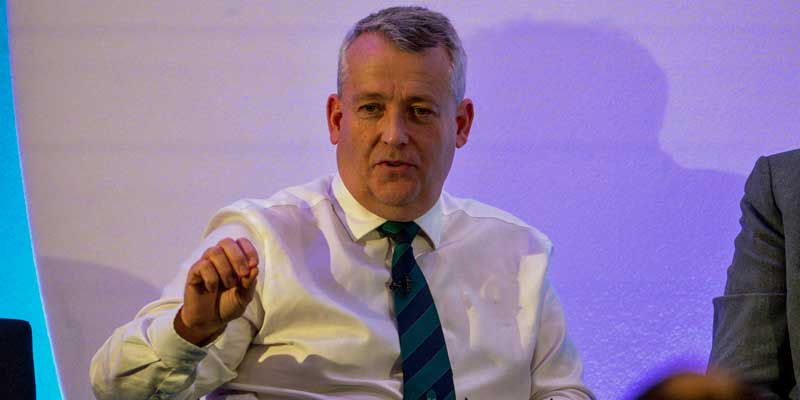
While knowing their numbers can empower farmers, a single framework and collaboration is needed to support them, says Professor Gilliland. A sentiment echoed by Dr Martin Scholten from Wageningen University & Aarhus University, an expert on Natural Capital Management and agriculture within the Netherlands.
“Farmers and agri-businesses should be partners. They can both find benefits in a society that is willing to pay for food and food production.”
Notes for editors
The Agricultural Industries Confederation (AIC) is the UK’s leading trade association, representing agricultural supply chain sectors including arable marketing, crop protection, agronomy, feed, fertiliser, and seed.
Formed in 2003, AIC has over 230 Members in the agri-supply trade which are responsible for £17.8 billion of annual farm trade.
AIC is marking 20 years as the leading voice of the UK agri-supply industry, working in support of modern, sustainable, commercial agriculture. Visit the website to find out more.
Political lobbying and policy influencing is a major part of its work, as well as supporting Members with technical information.
AIC Services, which is the professional services arm of the AIC, manages a range of services, including Assurance Schemes recognised by UK government as essential tools to underpin feed and food safety alongside fertiliser security. These include:
-
Feed Materials Assurance Scheme (FEMAS)
-
Feed Adviser Register (FAR)
-
Forage Assurance Scheme (FAA)
Visit the AIC website to find out more.
Press contact
Oli Hill, Communications Manager, AIC
+44 (0)1733 385230
[email protected]






